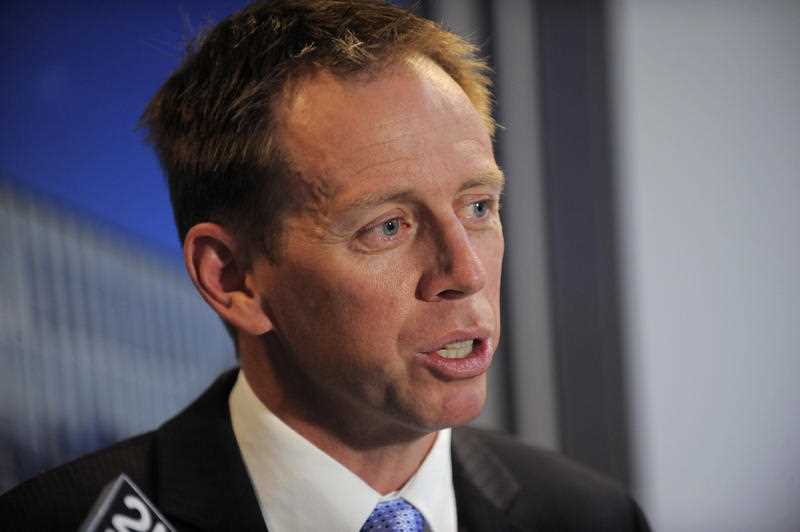
The ACT government has made it clear it will not be bullied into accepting an inadequate National Energy Guarantee, when an updated policy framework is presented to COAG energy ministers in a fortnight.
“We need to get a good outcome, not just any old outcome. That’s the position the ACT will take,” says ACT energy and climate change minister Shane Rattenbury, a Green in the territory’s minority Labor government.
In an interview for RenewEconomy’s Energy Insiders podcast, Rattenbury says the ACT is not opposed to the NEG per se, but it needs to deliver significantly more than is currently on the table.
“The NEG could be anything. It comes down to the architecture. If we get good architecture, if we get a good outcome that allows for new generation and the reliability issues identified by Finkel,” then it could be approved.
“But the issue of addressing climate change is one of great responsibilities of our generation. It’s very difficult to sign up to something that we know is not up to the job.”
The ACT, along with the other Labor states Queensland and Victoria has emerged as a key player, particularly since the defeat of the Labor government in South Australia, which among the states was the most vocal opponent of the NEG.
COAG energy ministers meet on April 20 to discuss the Energy Security Board’s latest “high level” overview of how the NEG might work, but the politics has been coloured by a renewed push by the coal industry, and its proxies in parliament, against renewables.
The pressure on states to wave through the NEG has intensified since the emergence of the so-called Monash Forum, which represents up to half the Coalition’s back bench, and wants the government to fund new coal-fired power stations.
The government has responded by calling on AGL to keep the Liddell plant open for longer, effectively demanding it to dump plans for new solar, wind and storage technologies in favour of keeping an ageing, heavy polluting and increasingly costly and unreliable generator open until Snowy 2.0 is built.
This is all done in the name, absurdly, of keeping prices low. In this article, we look at why the Coalition is still kidding itself on the price of coal power. We also look at the increasing and record uptake of rooftop solar.
The NEG has been criticized from all quarters since its rushed unveiling last October in an 8-page email to the government, and even more so after more meat was put on the bone of the policy earlier this year.
Not only does it have manifestly inadequate emissions reduction targets, the so-called reliability guarantee is ill-defined and may not be needed, the complex contractual arrangements may reduce competition and push up prices, and technology proponents warn it could kill off investments in wind, solar, demand management and storage technologies like batteries and pumped hydro.
The NEG was deliberately calibrated as a sop to the Coalition’s hard right rump, who had rejected all other policy proposals – from the carbon price, an emissions intensity scheme, through to Finkel’s clean energy target.
The NEG’s modeling was designed to appease that major faction of climate deniers, promising a major role for coal in 2030, and suggesting that renewable energy investment would effectively be brought to a halt.
The emissions reduction target of 26 per cent for the electricity sector is actually less than what would be achieved if there was no policy, several independent analysts say, and half what analysts say it should be.
The hard right, led by former prime minister Tony Abbott, former deputy prime minister Barnaby Joyce, backbench energy committee chair Craig Kelly, and other former Abbott government ministers that make up the Monash Forum (much to the horror of the Monash family that has labeled their cause anti-science and from the “horse and buggy era), has made it clear it will hold the Turnbull government to those promises.
Kelly told The Guardian that energy minister Josh Frydenberg should “tread carefully” on the NEG.
He also warned that the Coalition party room is not guaranteed, and wanted the NEG to be locked into federal legislation, not energy market rules, precisely because Kelly and the Coalition’s right wing do not want to allow any more ambition, or more renewables, in the future.
“You can’t tie the hands of a future government but the reason we are setting up the national energy guarantee is to try to create the greatest level of certainty for investment,” Kelly told The Guardian.
The push from the hard right will put increased pressure on the SCT and the Labor states to approve the NEG, even if it is clearly inadequate, on the basis that something must be better than nothing.
Rattenbury notes that is already the case, with the Murdoch media in particular (but also Fairfax) piling in to single the ACT as potential hold-outs.
Rattenbury agrees there are parallels to nearly a decade ago, when the Greens were pressured by the then Labor government to accept what was viewed by many as a fundamentally flawed CPRS. Now, it’s the Coalition attempting to get them across the line with an inadequate NEG.
“I have been subject to articles suggesting it is an outrage that the ACT is in a position to block this deal. But the details are going to be important,” he said.
He did, however, say that April 20 was not a “drop-dead” moment, mainly because the ministers may not have enough detail on the table to make a final decision at that time.
It is likely, in RenewEconomy’s view, that enough could be put on the table to allow the Energy Security Board to continue their work. The important moment will come in August or September when the fine details are released and a vote is taken.
Rattenbury says that the ACT has been holding talks with other states, particularly those with high state-based targets, such as Queensland and Victoria, and South Australia before the new conservative government was elected.
“I think that many of the jurisdictions have real concerns,” Rattenbury says. “We have such a lack of detail … that anyone who says will sign up to the NEG is not being honest.”
He said even conservative states will have issues about some of the details. And it is known that South Australia will be worried about the potential to reinforce the power of the state’s market oligopoly.
Several proposals have been made to address this – such as excluding small retailers from the obligation, switching the obligation back from the retailers to generators, or changing the nature of the contracts.
Some believe that such changes could be hard to achieve. The only way to make it workable would to allow the rules to be so loose it may just slip back to being an effective clean energy target, a la Finkel.
Rattenbury was dismissive of the Coalition right wing, and the emergence of the Monash Forum, even if he did recognize the power of the politics involved and the timing of their intervention ahead of the COAG meeting.
“What we are seeing is the last gasp of a dying breed. Those who want to continue to champion fossil fuel industry are trying to turn back the tide.
“The Monash Forum …. it feels like the tail is trying to wag the dog. But members of the National Party have been holding the policy to ransom.”






